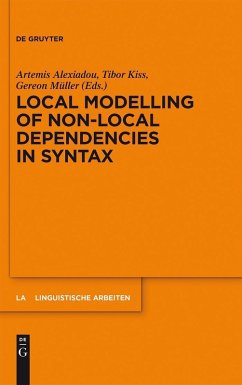Syntactic dependencies are often non-local: They can involve two positions in a syntactic structure whose correspondence cannot be captured by invoking concepts like minimal clause or predicate/argument structure. Relevant phenomena include long-distance movement, long-distance reflexivization, long-distance agreement, control, non-local deletion, long-distance case assignment, consecutio temporum, extended scope of negation, and semantic binding of pronouns. A recurring strategy pursued in many contemporary syntactic theories is to model cases of non-local dependencies in a strictly local way, by successively passing on the relevant information in small domains of syntactic structures.
The present volume brings together eighteen articles that investigate non-local dependencies in movement, agreement, binding, scope, and deletion constructions from different theoretical backgrounds (among them versions of the Minimalist Program, HPSG, and Categorial Grammar), and based on evidence from a variety of typologically distinct languages. This way, advantages and disadvantages of local treatments of non-local dependencies become evident. Furthermore, it turns out that local analyses of non-local phenomena developed in different syntactic theories (spanning the derivational/declarative divide) often may not only share identical research questions but also rely on identical research strategies.
Dieser Download kann aus rechtlichen Gründen nur mit Rechnungsadresse in A, B, BG, CY, CZ, D, DK, EW, E, FIN, F, GR, HR, H, IRL, I, LT, L, LR, M, NL, PL, P, R, S, SLO, SK ausgeliefert werden.









